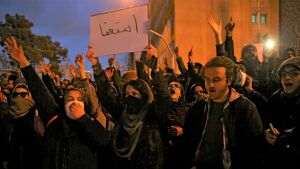The big novelty brought about by the year 1990, the first year of transition to a market economy, as compared to 1989, the last year of communism, was that Romania started to move from being a society socially organized according to positions and statuses - who you were, what you did, how close you were to the top - to a society organized according to a much simpler criterion: "how much are you worth?" Apparently a paradox, in order to make one's fortune gradually become more important than one's position, The State, including The National Bank - had to flood the market with money. The unspoken strategy adopted by The National Bank and the governments that came to power after the fall of communism was to cover all positions of importance with money and then, in order to make those positions seem unimportant, to give even more money to those who were making fortunes instead of climbing the social ladder.
Neither The National Bank, which manages the ROL, nor the governments, which have managed both the economy and society, are fully aware of this phenomenon. In my opinion, it is high time they realized that, beyond the technical aspects of inflation and the exchange rate - which they have managed to master without trouble - there have also been many crucial factors stemming from the social reconstruction of the Romanian society during a transition from a centralized economy to a market economy, aspects which they often ignored.
The reason why I am bringing these factors up now is that these factors continue to function and, by deciding to introduce "the heavy ROL" instead of the existing "light ROL," both The National Bank and The Nastase Government are doing much more than they realize, based on their technical knowledge of the monetary mass, the exchange rate, the prices, the salaries, the aggregated income per household, the exports and "The Invisible Hand" that Adam Smith defined over two centuries ago.
What they have been doing until now and what they will be doing further is to restructure the essence of the Romanian society.
The most popular interpretation of "the heavy ROL" is that we will simply replace the existing measurement unit for prices with another unit, 1000 or 10000 times larger. A mere formality as to where to put the comma. As if we have been used to measuring distances between cities in centimeters and, all of a sudden, we decide to measure it in kilometers.
Nothing actually changes through such changes in the measurement unit. Distances remain the same, prices remain the same, salaries remain the same, bank deposits and loans remain the same, except for the fact that we will be writing and calculating them with less digits.
A net salary of 3.5 million ROL will become, after "the heavy ROL" kicks in, a salary of 3,500 "new" ROL or 350 "new" ROL, depending on how many zeros we decide to delete.
Apparently, the only matter about to change is of an arithmetic nature. In fact, we are about to move from one kind of society to another.
First of all, we are going to move to a society with much more stable prices, especially retail prices. Moreover, the smaller the prices are now, the more stable they will be, but, when they start going up, the increase will be more substantial and therefore more visible. The general perception of prices will be more solid and this will impact the economy: for instance, the ROL/USD and ROL/EUR exchange rates - which fluctuate by one-to-two percent per day currently - will gain a more solid image as the public will notice that the ROL-denominated figure remains the same for an an entire year, with the exception of the decimal sub-division known as "bani."
Second of all, we are going to move to a society where comparisons to the developed world will be much more direct and suggestive, given the numerical similarities.
An effect that has been less considered so far, will be that coin-based vending machines will become popular very quickly and compete with the scores of kiosks crowding the streets today.
Nonetheless, the most important effect of the denomination process will be to stabilize the differences between civilizations that are currently co-existing in Romania. We are going to have a civilization of coins and barters in rural areas, a civilization combining many coins and few bills in urban areas and a civilization of bills in the centers of the great cities. Until now, these different civilizations have been using different currencies and denominations: thousands and tens of thousands of lei in the rural areas and the small towns, hundreds of thousands and millions of lei in the cities, and dollars and euros in the high-income, high-prices areas of the residential areas of the great cities. Denomination and the "heavy" ROL will stabilize, define and especially legitimize the differences of wealth that have already taken root in Romanian society. From now on, wealth will no longer be measured in terms of how big someone's home is or what kind of car someone is driving, but in terms of how many digits someone's account balance has, because from now on such digits will be less numerous and easier to comprehend.
Last but definitely not least, the denomination of the ROL is a loud and clear message to the entire Romanian society (along with the lower inflation rate), the message that the time for easy money is over. The "heavy" ROL is merely an arithmetic convention and will become "heavy" indeed only if it is earned through honest work. Only then will the ROL and the honest work behind it be valued and appreciated.























































